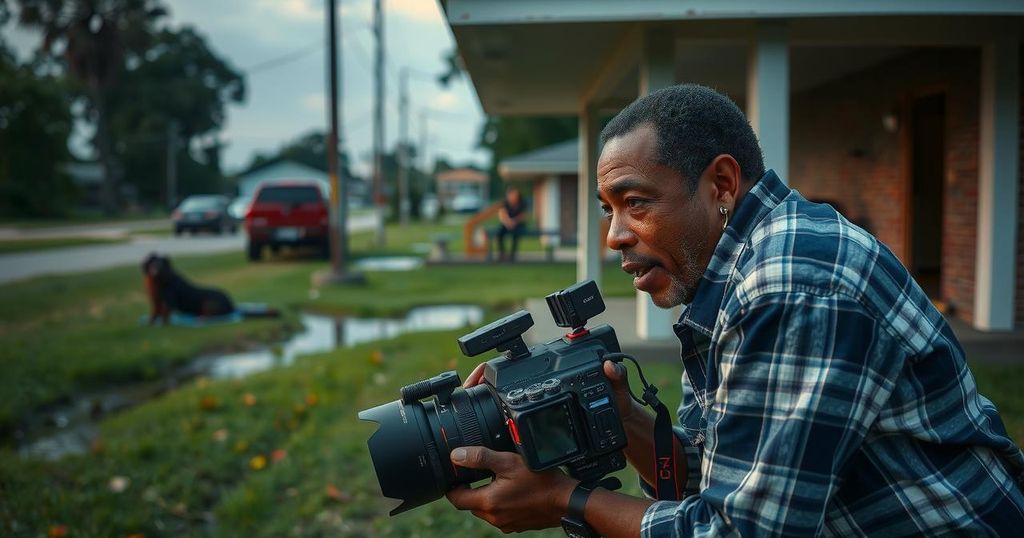Halle Parker: Amplifying Voices Impacted by Environmental Challenges in Coastal Louisiana
Halle Parker, an environmental journalist in New Orleans, reports on the intricate dynamics of water-related threats and joys experienced by coastal Louisiana residents. She emphasizes the importance of sharing stories from marginalized communities affected by climate change. Through audio journalism and community engagement, she advocates for diverse representation and highlights the pressing environmental issues in the region, particularly impacting Indigenous groups.
Halle Parker, a journalist residing in New Orleans, addresses the complex relationship between the local communities and water in coastal Louisiana, as she navigates the dual threats and benefits provided by this natural resource. Surrounded by water, New Orleanians grapple with constant anxiety about flooding and storm-related disasters. Parker emphasizes that for residents, worries about home and vehicle inundation are prevalent, often exacerbated by even modest rainfall. As an environmental reporter for WWNO and WRKF’s Coastal Desk, she chronicles the experiences of those living amidst these contradictions, recognizing water not only as a hazard but also as a source of joy that facilitates recreation and sustenance. Parker views her role in journalism as both a privilege and a responsibility to illuminate the narratives of those affected by climate change. Originally from Spotsylvania, Virginia, Parker’s passion for storytelling and social justice began at a young age. Her early introduction to journalistic ethics instilled a commitment to uncovering truth, which she believes is integral to fostering societal progress. Her journey in environmental journalism commenced in Virginia, where she reported on farmers confronting the impacts of climate change, even if some were reluctant to explicitly label it as such. Relocating to Louisiana, Parker became acutely aware of the ongoing land loss crisis, recognizing Louisiana as a critical site for addressing broader environmental issues nationally. Transitioning from print to radio, she appreciates how audio journalism can amplify personal narratives, allowing her audience to connect with the emotional weight of environmental struggles. In addition to her reporting, Parker co-hosts a podcast, Sea Change, focusing on the environmental challenges facing Gulf Coast communities. She highlights the intersection of environmental issues with racial and economic disparities, feeling a particular duty to represent marginalized voices, given her own background. Parker actively engages with community organizations, empowering local storytellers to share their experiences and advocating for more diverse representation within the media landscape. Parker finds profound fulfillment in spotlighting the stories of Indigenous communities whose futures are threatened by rising sea levels. She draws inspiration from young leaders such as Devon Parfait, who are navigating the harsh realities of potential relocation while fostering communal resilience. Ultimately, Parker perceives her work as a means to elevate crucial voices, those on the frontline of existential challenges, underscoring her commitment to advocacy through journalism. In her perspective, these narratives are not merely tales of despair, but opportunities for collective reflection and response amidst environmental adversity.
The article delves into the complex relationship that communities in coastal Louisiana, particularly New Orleans, have with water. It highlights the dual nature of water as both a threat to safety and a source of recreation and livelihood. Halle Parker, an environmental journalist, articulates the anxiety residents face concerning water-related disasters as well as their appreciation for the recreational joy it provides. The article also examines broader themes of social justice in journalism, particularly concerning marginalized communities who disproportionately experience environmental threats.
Halle Parker’s work embodies a commitment to highlighting the voices of those most affected by environmental changes in coastal Louisiana. Through her journalism, she seeks to address the many emotional and socio-economic challenges faced by local communities while also recognizing their resilience and capacity for adaptation. Her efforts reveal the vital connection between environmental health and social equity, emphasizing the need for diverse voices in media to adequately represent these critical narratives.
Original Source: www.waltonfamilyfoundation.org




Post Comment